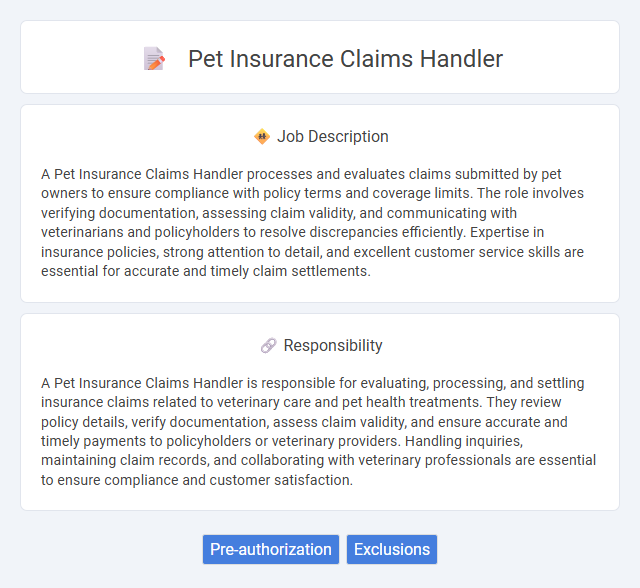
A Pet Insurance Claims Handler processes and evaluates claims submitted by pet owners to ensure compliance with policy terms and coverage limits. The role involves verifying documentation, assessing claim validity, and communicating with veterinarians and policyholders to resolve discrepancies efficiently. Expertise in insurance policies, strong attention to detail, and excellent customer service skills are essential for accurate and timely claim settlements.
People who possess strong attention to detail, excellent communication skills, and empathy are likely suitable for a Pet Insurance Claims Handler role. Individuals comfortable working with policies, assessing claims accurately, and managing customer concerns may find this job aligns well with their abilities. Those who prefer routine tasks without much emotional interaction might have lower suitability for this position.
Qualification
A Pet Insurance Claims Handler must have strong analytical skills and a keen understanding of insurance policies related to veterinary care. Proficiency in data management and claims processing software is essential for accurate and efficient claim assessments. Experience in customer service and knowledge of veterinary terminology significantly enhance the ability to evaluate claims and communicate effectively with policyholders and veterinary professionals.
Responsibility
A Pet Insurance Claims Handler is responsible for evaluating, processing, and settling insurance claims related to veterinary care and pet health treatments. They review policy details, verify documentation, assess claim validity, and ensure accurate and timely payments to policyholders or veterinary providers. Handling inquiries, maintaining claim records, and collaborating with veterinary professionals are essential to ensure compliance and customer satisfaction.
Benefit
Pet insurance claims handlers likely improve customer satisfaction by efficiently processing claims and ensuring timely reimbursements. They probably reduce financial stress for pet owners by verifying coverage details and facilitating smooth claim approvals. This role may also enhance the insurer's reputation through accurate and empathetic communication.
Challenge
Handling pet insurance claims likely involves managing complex cases where policy details and veterinary treatments vary extensively, requiring careful analysis and attention to detail. The role probably demands balancing empathy for pet owners with strict adherence to company policies and regulatory standards. Navigating frequent updates in healthcare regulations and ensuring timely claim resolutions might present continual challenges in this position.
Career Advancement
A Pet Insurance Claims Handler role offers significant career advancement opportunities through gaining expertise in policy evaluation, claim processing, and customer service within the pet insurance sector. Developing skills in risk assessment, regulatory compliance, and claims negotiation can lead to senior positions such as Claims Supervisor or Risk Manager. Mastery of digital claims management systems and data analytics enhances prospects for leadership roles and specialization in veterinary insurance underwriting.
Key Terms
Pre-authorization
Pet insurance claims handlers manage pre-authorization processes to verify coverage and ensure claim validity before treatment approval. They analyze veterinary reports, policy terms, and claim details to expedite authorization while preventing fraudulent or unauthorized expenses. Accurate pre-authorization reduces claim processing time and improves customer satisfaction by facilitating prompt veterinary care.
Exclusions
Pet Insurance Claims Handlers review and process reimbursement requests, ensuring compliance with policy terms and conditions. Common exclusions include pre-existing conditions, cosmetic procedures, and elective treatments, which handlers must identify to prevent claim denials. Expertise in recognizing policy limitations, such as breed-specific disease exclusions and unapproved treatments, is essential for accurate claims adjudication and minimizing fraudulent claims.
 kuljobs.com
kuljobs.com